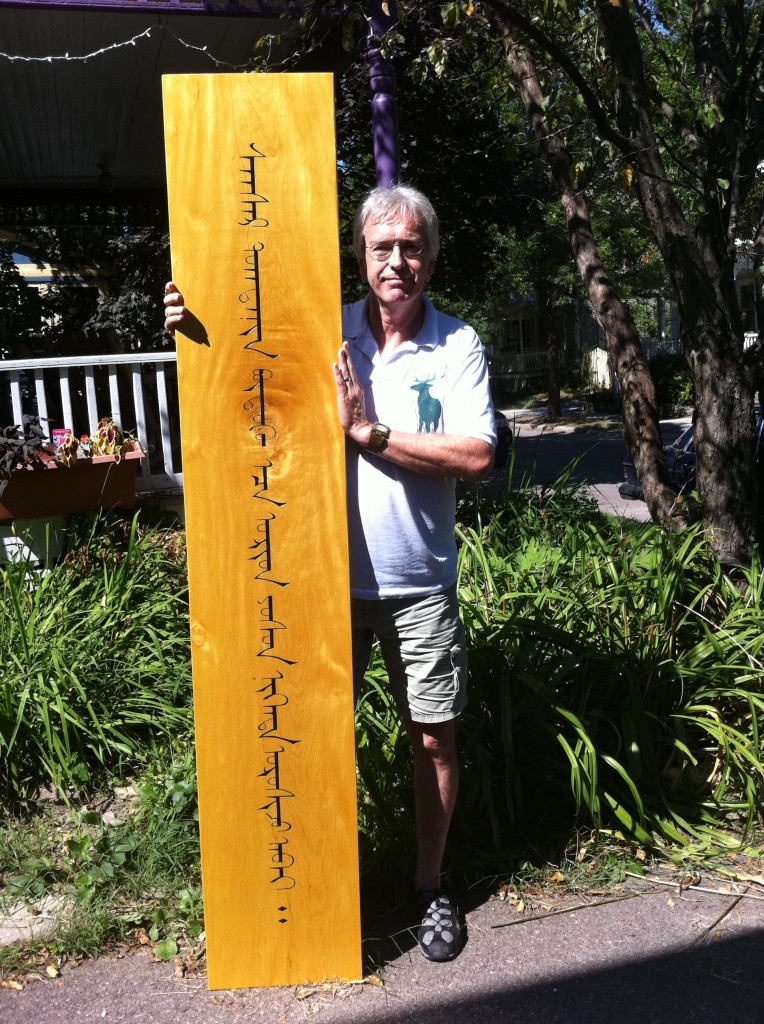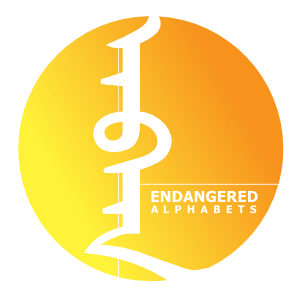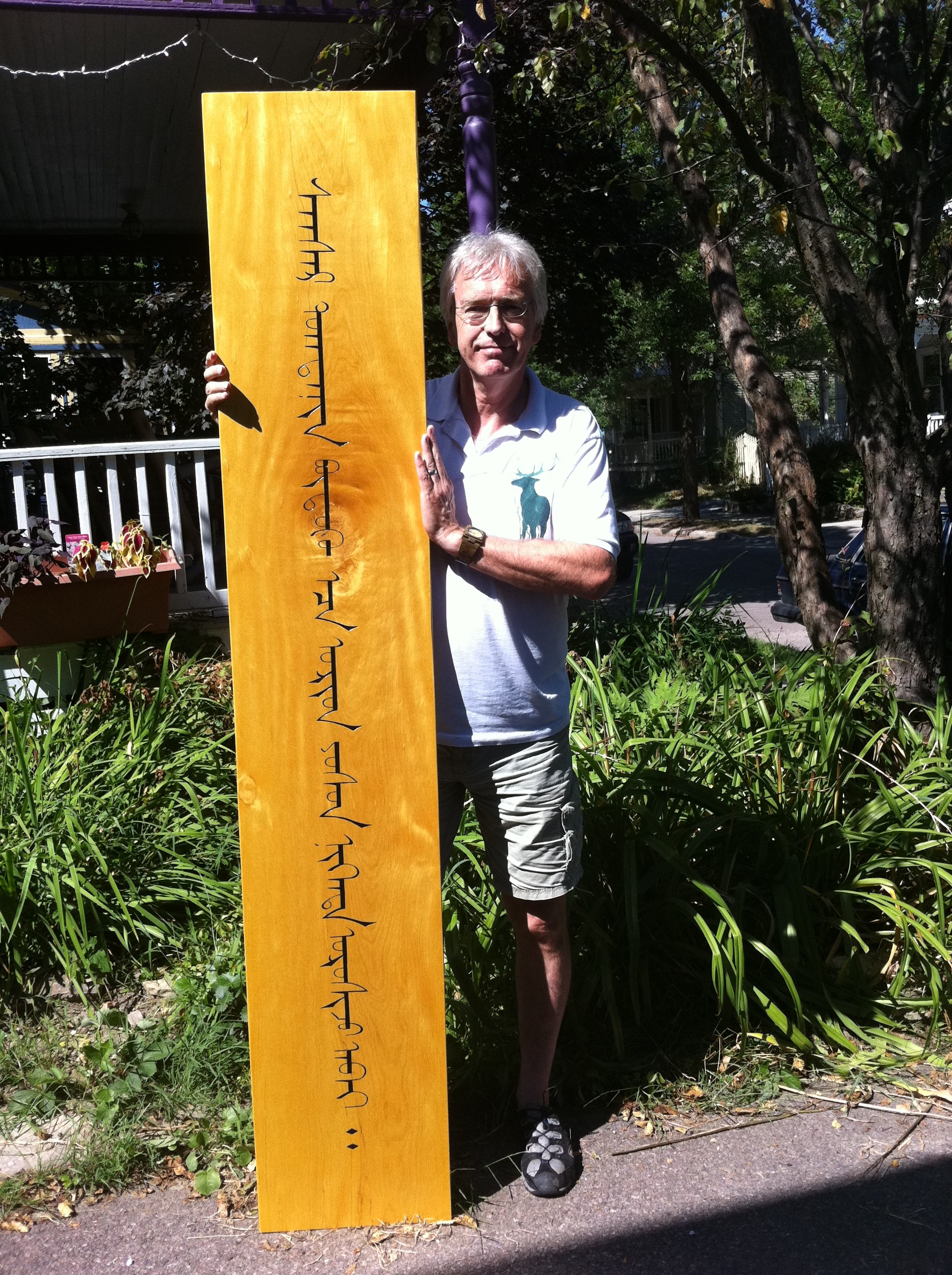In the Beginning: Mongolian

Ever since I started thinking of writing as a spiritual act (see the section beginning on page 136 in my book Endangered Alphabets) I’ve been fascinated by the sentence, from the opening of the Gospel According to St. John, “In the beginning was the word.”
A couple of months ago, thinking ahead to the 2011 edition of the Burlington Book Festival in September, I decided I wanted to create a monumental piece for the festival, something so large it commanded attention, something that would stand at the entrance to the festival as a kind of gateway, something that would challenge the festivalgoers’ thinking from the moment they stepped inside.
Thinking of a tall, monolithic vertical piece led me to think of the world’s vertical scripts, and quite by chance I discovered that the Bible has been translated into Mongolian, the language and script of Genghis Khan, and that the text of John was available online.
As I copied it, drew the characters by hand (the piece of wood being far too large to blow up the text on a copier) and began carving, I kept thinking about the appropriateness of the sentence from one new direction after another.
In a very local sense, the sentence is ideal for a book festival. The beginning of the book is the word; the beginning of discussion of the book is the word. The word is what makes us thinking creatures; it’s what makes the cluster of liberal virtues that are at the heart of writing, and teaching writing, and the free conversation of ideas that is recorded by writing and transmitted via writing.
The sentence also has a great deal to say about the relationship between writing and spirituality. Yes, the sentence is from a Christian text, but in truth Christianity, Judaism and Islam all were and are religions heavily steeped in writing. The word Bible, after all, means “book,” and the word gospel comes from the Anglo-Saxon words meaning “good writing.” In its earliest years Islam tolerated Christianity and Judaism because the Arabs respected that these, too, were people of The Book.
More than that, though: writing was seen by some people (such as the Mandaeans) as having divine origin: it was too great an achievement to have been developed by humans, they believed, and had been divinely created and then given to us. And if that sounds far-fetched, consider the Old Testament. The Jews are simply one of many wandering desert peoples, unsure of their direction, their ethics, their leadership, their religious affiliation, until Moses returns from the mountain with the Word of God written down on tablets. This writing (and it’s easy to see why spoken words alone would not have had the same impact or credibility) became literally the foundation and basis for Jewish society, religion and culture. It is what made them who they would become. In the beginning of their identity as a people was the word.
And it’s worth noting in passing that the act of writing mirrors the divine act of creation: before God there was nothing, we are told; ad in an act of divine creative imagination he converts insubstantial thought into substance. The immaterial becomes material. He spoke, and it was so. In the beginning was the word, and everything else followed from that. And that act of creation is still possible to anyone who writes (or paints, or carves): an idea, the least substantial of all human things, is transformed into something everyone can see, and everything else follows.
Yet there’s one other possible meaning to this extraordinarily pregnant assertion. One of the curious things about the evolution of human beings is that for a very, very long time, for the vast majority of the time between primeval Lucy and ourselves, the human brain remained roughly the same size. It wasn’t until we began to acquire and use language (or so it is now believed) that our brains underwent rapid and radical growth, and we started to look and act less like the great apes and more like what we think of as early humans. In other words, in the beginning of humanity as we understand it was the word.


In the Beginning: Mongolian « Feeds « Theology of Ministry
August 5, 2011 @ 7:13 am
[…] from Icerocket blogs: In the Beginning: Mongolian Tags: else-load, typeof-add, var-load Categories: Feeds You can leave a response, […]
October 16, 2011 @ 10:45 am
I love your phrase above: “…an idea, the least substantial of all human things, is transformed into something everyone can see, and everything else follows”!
I have just been reading your Endangered Alphabets book and am very moved and inspired! Thank you for your attention to the magic and materiality of language. I am working on a related project involving the creation of a giant book that people can walk in, a celebration and exploration of the materiality and spirituality of the book (in this age of Kindle, et cetera), including an essay on the history of the book as object; and this morning I realized that I am, ironically, caught in the tension between the abstract freedom of the idea, the imagination, the thought and its physical manifestation in matter. Will it hold, stand up, crumble, collapse?! What will it be made of? Will it be worth the trouble to build what already exists perfectly in the mind, or in words or images in 2-dimensions on the page?! Your practice and process of physically carving the words into wood is a beautiful tribute to the magical (or at least existential) process and promise of manifestation and enactment, of believing in the Word and inscribing it with renewed life (as, mystically, God creates the world over and over, gives birth to the son over and over; as the artist or any of us who dream, create(s) the world anew every moment).
Endangered Alphabets » Blog Archive » Hunting the Dinosaur: Glagolitic
June 10, 2012 @ 10:15 pm
[…] knew exactly what the text should say. It should be a text I’ve carved twice before (in Classical Mongolian), a text that has all kinds of interesting meanings but is especially suitable for someone like Will […]